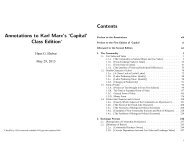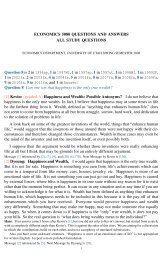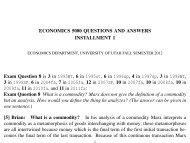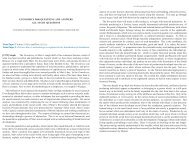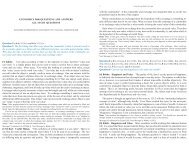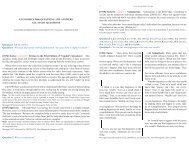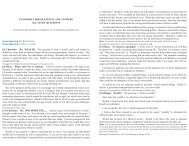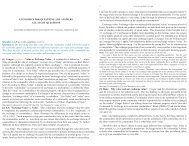Question 1 What did Marx mean with his formu - University of Utah
Question 1 What did Marx mean with his formu - University of Utah
Question 1 What did Marx mean with his formu - University of Utah
Create successful ePaper yourself
Turn your PDF publications into a flip-book with our unique Google optimized e-Paper software.
U <strong>of</strong> <strong>Utah</strong> Econ 5080 2007fa 55<br />
make than weaving linen, which obviously <strong>mean</strong>s more labor would be involved in making<br />
the coat. Any labor value should be added to the produced product, so in t<strong>his</strong> case, more<br />
labor value would be added to the price <strong>of</strong> the coat.<br />
<strong>Marx</strong> sums t<strong>his</strong> section up by stating that smaller quantity <strong>of</strong> complex labor ends up being<br />
equal to a larger quantity <strong>of</strong> simple labor.<br />
Hans: The discovery <strong>Marx</strong> was so proud <strong>of</strong> was not that weaving labor is different than tailoring, but that the labor<br />
which produces use-value is different from the labor which produces value. He called the first labor concrete labor,<br />
and the second abstract labor.<br />
I.e., your first paragraph is right. But the first sentence in the second paragraph is wrong. Only the abstract<br />
labor is homogeneous. Concrete labor isn’t homongeneous, there are many qualitatively different kinds <strong>of</strong> concrete<br />
labor.<br />
Message [74] referenced by [2008fa:628]. Next Message by Poppy is [162].<br />
<strong>Question</strong> 114 is 100 in 2005fa, 113 in 2007SP, 114 in 2008fa, and 119 in 2009fa:<br />
<strong>Question</strong> 114 Coat and linen are qualitatively different use-values. Are they exchanged<br />
because their use-values are different, or because the labors in them are different?<br />
[71] JohnGalt: Who Needs A Coat When It’s Summer? Precisely because coats and<br />
linen are produced by different classes <strong>of</strong> labor, they possess different use-values. Without<br />
both <strong>of</strong> these components, coats and linen, or any other two distinct commodities would not<br />
be able to be traded. First, t<strong>his</strong> is because <strong>with</strong>out different classes <strong>of</strong> labor no distinct commodities<br />
would be produced. T<strong>his</strong> leads to the second dilemma, a lack <strong>of</strong> labor distinction<br />
would fail to allow use-value to be created. Thus, the relative values <strong>of</strong> commodities, such<br />
as could be produced, would be unable to be determined.<br />
It is therefore essential to recognize that distinctions in use-value or labor are related<br />
and necessary and have been so as the capitalist system has developed. One cannot wholly<br />
exist <strong>with</strong>out the other in order for t<strong>his</strong> system to function seamlessly. Because <strong>of</strong> t<strong>his</strong>, an<br />
infinite amount <strong>of</strong> differentiation and variation must exist to bring forward the use-value <strong>of</strong><br />
an increasing array <strong>of</strong> commodities that are both desired and <strong>of</strong>fered in the market which<br />
facilitates their trade.<br />
Message [71] referenced by [77]. Next Message by JohnGalt is [145].<br />
[77] Hans: Causality Disentangled. <strong>Marx</strong> argues: whenever there is commodity production,<br />
a social division <strong>of</strong> labor must be underneath. T<strong>his</strong> is pretty obvious, and we can just<br />
leave it at that. But <strong>Marx</strong> tries to be very precise, and my Annotations try to identify each<br />
step in <strong>his</strong> derivation. If you read the text closely, you find two statements which seem to be<br />
at odds <strong>with</strong> each other. In 132:3, <strong>Marx</strong> says:<br />
Were these two objects not qualitatively different use-values ..., they could<br />
not face each other as commodities.<br />
And in 132:5/o he says:<br />
Use-values cannot confront each other as commodities, unless they are produced<br />
by qualitatively different useful labors.<br />
<strong>Question</strong> 114 tries to get clarity about t<strong>his</strong>: is it the first or the second? JohnGalt [71]<br />
stresses that qualitatively different use-values cannot exist <strong>with</strong>out qualitatively different<br />
56 2007fa Econ 5080 U <strong>of</strong> <strong>Utah</strong><br />
useful labors. T<strong>his</strong> is right. But even if the differences in use-values come from differences<br />
in labor, the use-value differences can have their own effects – to say otherwise would<br />
be the error <strong>of</strong> reductionism. Indeed, if you look at the exchange process itself, only the<br />
use-values are present; the labor is somewhere in the background but is usually not talked<br />
about. Therefore I would say: the exchange directly requires different use-values, and since<br />
different use-values presuppose different labor processes, one can conclude from t<strong>his</strong> that<br />
exchange is also based on different labors.<br />
I think t<strong>his</strong> is how <strong>Marx</strong> <strong>mean</strong>t it. The first sentence gives the direct effect, and the second<br />
the direct and indirect effect. T<strong>his</strong> is a small point, but my Annotations try to follow <strong>Marx</strong><br />
even in these small matters, so that we know we are not missing something pr<strong>of</strong>ound.<br />
Message [77] referenced by [2008fa:166]. Next Message by Hans is [81].<br />
<strong>Question</strong> 118 is 51 in 1995WI, 61 in 1995ut, 63 in 1996ut, 71 in 1997sp, 66 in 1997ut,<br />
92 in 2003fa, 103 in 2004fa, 118 in 2008fa, 126 in 2010fa, 146 in 2011fa, and 145 in<br />
2012fa:<br />
<strong>Question</strong> 118 (a) Why is it necessary for the exchange <strong>of</strong> commodities that they contain<br />
qualitatively different kinds <strong>of</strong> useful labor?<br />
(b) Can commodity production exist <strong>with</strong>out division <strong>of</strong> labor?<br />
(c) Can division <strong>of</strong> labor exist <strong>with</strong>out commodity production?<br />
(d) How does commodity production influence the division <strong>of</strong> labor?<br />
[126] Jeff: Commodity Production. a) <strong>Marx</strong> argues that it is important to have qualitatively<br />
different kinds <strong>of</strong> useful labor because that is what gives things its value. These<br />
different values allow for things to be exchanged based on the wants <strong>of</strong> individuals and how<br />
much the commodity is valued.<br />
b) According to <strong>Marx</strong>, commodity production is not possible <strong>with</strong>out the division <strong>of</strong> labor<br />
c) Yes, division <strong>of</strong> labor can exist <strong>with</strong>out commodity production<br />
d) Because commodity production is not possible <strong>with</strong>out division <strong>of</strong> labor, the more<br />
advanced the commodity manufacturing is, the more specialized the division <strong>of</strong> labor will<br />
become.<br />
Hans: Your b), c), and d) are right, but a) isn’t.<br />
Next Message by Jeff is [225].<br />
<strong>Question</strong> 120 is 79 in 1999SP, 94 in 2003fa, 105 in 2004fa, 106 in 2005fa, 119 in 2007SP,<br />
and 130 in 2010fa:<br />
<strong>Question</strong> 120 When <strong>Marx</strong> wrote that labor is the father and the earth the mother <strong>of</strong> usevalues,<br />
should he also have included produced <strong>mean</strong>s <strong>of</strong> production in addition to nature<br />
and labor?<br />
[66] Josh: No. <strong>Marx</strong> <strong>did</strong> not include produced <strong>mean</strong>s <strong>of</strong> production in addition to nature<br />
and labor, because the produced <strong>mean</strong>s <strong>of</strong> production is a product <strong>of</strong> labor.<br />
<strong>Marx</strong> states “Labor, then, as the creator <strong>of</strong> use-values, as useful labor, is a condition<br />
<strong>of</strong> human existence which is independent on all forms <strong>of</strong> society; it is an eternal natural



